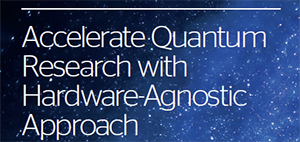Q-score
Quantum computing is reinventing the way we tackle complex issues, solving the problems in a matter of seconds or minutes which could take years to solve in classical computing. For quantum computing to deliver its promises, it is imperative that the industry reaches consensus for an objective, reliable and open metrics which can benchmark all programmable quantum processors equally.
Q-score, a new quantum metrics, has been reviewed and is first unveiled by the Atos Quantum Advisory Board, a group of international experts, mathematicians and physicists – authorities in their field, on the 4th December 2020.
What’s Q-score?
Advocated and developed by Atos, Q-score is a new quantum metrics reference, applicable to all quantum processors. Q-score measures the efficiency of running a representative quantum application, a system’s effectiveness at handling real-life problems, instead of its theoretical or physical performance. In offering universal and free access to Q-score, Atos paves the way to accelerate quantum applications in life.
Application driven
-
- Measure the capacity of a QPU to solve a real operational problem, not technical KPIs
- Applicable to quantum supremacy and beyond
- Measure the capacity of a QPU to solve a real operational problem, not technical KPIs
-
- Benchmark a QPU running near-term quantum algorithm, delivering concrete applications
Open and easy-to-use
- Universal and free access to all via software package, tools and methodologies
- Measure the near-term QC algorithm, technology-neutral
- No need from heavy computation to calculate the result
Objective and reliable
-
- Atos is technology agnostic, independent from QPU vendors
- Beyond the simulatability limit, runnable for quantum supremacy and beyond
- Taking into consideration of “wall-time” as one of the parameters
- Atos is technology agnostic, independent from QPU vendors
Why Q-score?
Benchmark application performance
Simple, no need for heavy computation

Applicable to NISQ era and beyond
Wall-time of applications measured

Understanding Q-score using the Travelling Salesman Problem (TSP)
Today’s most promising application of quantum computing is solving large combinatorial optimization problems. Examples of such problems are the famous TSP problem and the less notorious but as important Max-Cut problem.
Problem statement: a traveler needs to visit N number of cities in a round-tour, where distances between all the cities are known and each city should be visited just once. What is the absolute shortest possible route so that he visits each city exactly once and returns to the origin city?
Simple in appearance, this problem becomes quite complex when it comes to giving a definitive, perfect answer taking into account an increasing number of N variables (cities). Max-Cut is a more generic problem, with a broad range of applications, for instance in the optimization of electronic boards or of positioning of 5G antennas.
Q-score evaluates the capacity of a quantum processor to solve these combinatorial problems.
“Quantum computing promises changes of such phenomenal proportions, through revolutionary speed and computing power, that it will have a huge impact not only on science or business but also on society as a whole.
“Bringing these promises into reality is a long, yet incredible adventure, filled with exciting discoveries and experiments in the field of real-life application development in order to prove that quantum computing already has relevance today.
“We are at the forefront of research and development with the world’s highest-performing quantum programming appliance, the Quantum Learning Machine, a Quantum Program with a dedicated team of leading experts within our organization, and a Quantum Scientific Council that gathers some of the world’s leading scientists, including a Nobel prize winner, alongside industry experts and partners.
What do experts say
 “Leveraging its widely acknowledged expertise in supercomputing, Atos is working to provide quantum computing users with early and tangible computational advantage on various applications by building on its ‘Atos Quantum’ R&D program, with the aim of delivering near-term results through a hybrid quantum supercomputing approach. The launch of Q-score is a key innovative step that offers a way for the quantum computing community to better characterize gains by focusing on real-life use-cases.”
“Leveraging its widely acknowledged expertise in supercomputing, Atos is working to provide quantum computing users with early and tangible computational advantage on various applications by building on its ‘Atos Quantum’ R&D program, with the aim of delivering near-term results through a hybrid quantum supercomputing approach. The launch of Q-score is a key innovative step that offers a way for the quantum computing community to better characterize gains by focusing on real-life use-cases.”
Bob Sorensen
Senior Vice President of Research,
Chief Analyst for Quantum Computing at Hyperion Research, LLC
![]()
Atos proposes “Q-score” in tackling quantum challenges
Serge Haroche
Nobel Laureate in Physics 2021, Member of French academy of Sciences Emeritus Professor at College de France, Member of Atos Quantum Advisory Board
Atos Quantum and Quantum Scientific Council
Launched in 2016, Atos Quantum is an ambitious program developed to anticipate the future of quantum computing.
It has taken a hardware-agnostic approach, in crafting quantum-powered supercomputers and enabling end-user applications. Atos’s ambition is to be a major player in four domains:
![]()
Quantum programming
and simulation
![]()
The next-generation quantum-powered supercomputers
![]()
Quantum expert consulting services
![]()
Quantum-safe cybersecurity
Recent news
Press release
December 4, 2020
Atos announces Q-score, the only universal metrics to assess quantum performance and superiority
July 8, 2020
November 4, 2020
Atos joins forces with start-up Pasqal to accelerate High Performance Computing using quantum neutral atom technology
July 8, 2020
Atos establishes Life Sciences Centre of Excellence to support researchers worldwide
July 7, 2020






